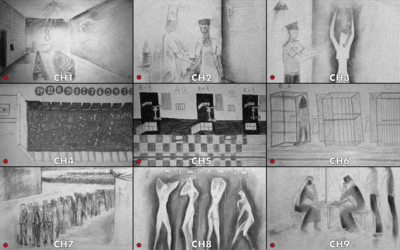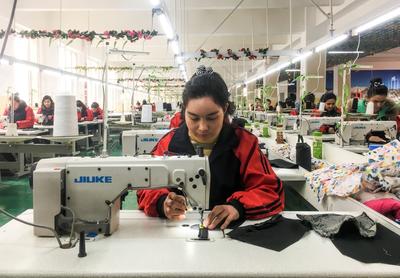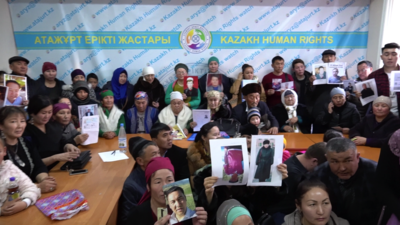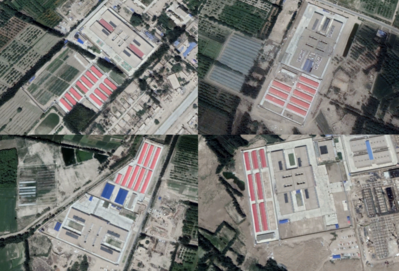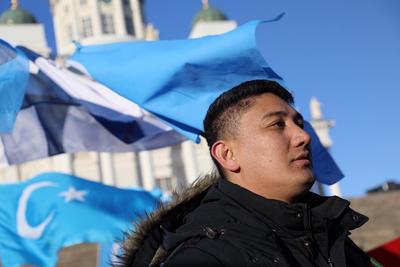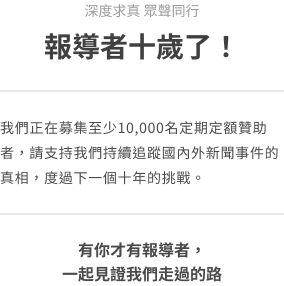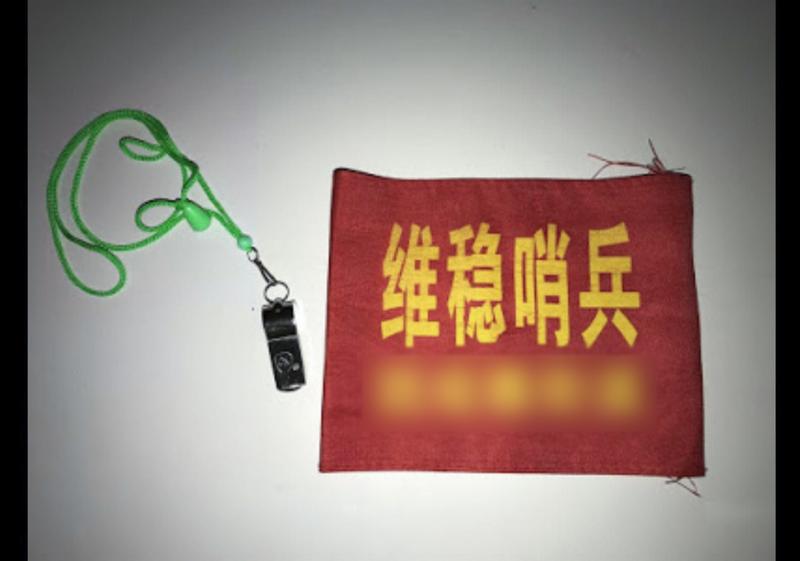
Desperate Message from Han People in "Re-Education Camps" in Xinjiang
Victims in "re-education camps" in Xinjiang Uygur Autonomous Region are not limited to ethnic minorities. While searching for truth across the border, The Reporter is informed that a relative to Han victims is reaching out to international organizations. She is sending out mayday signals for family members under house arrest and other imprisoned Han communities.
In our phone calls, her urgency and thirst for truth, justice, and family reunions are no different to Kazakhs or Uygurs in previous interviews. Her descriptions give us a glimpse into how Chinese government erects insurmountable walls between ethnic groupsand incites hatred between civilians. Communities are silenced, blackmailed, and restricted in freedom by Chinese Communist Party (CCP) in the name of ensuring stability.
In Xinjiang, all official policy whitepapers pivot on "ensuring stability" and "long-term governance". Not only are those minorities accused of "radicalized" or "influenced by external forces", but also are the Han people in Xinjiang forbidden to talk about their lives with journalists.
After contemplating for a week, Han resident Li Xin (alias) in exile decided to take the risk and accept our video interviews. After we talked twice for nearly three hours in total, she delivered a series of evidence to us, including propaganda by local governments, identification papers, written requests for leave, several recordings of police interrogation, and photos. From her personal experiences and documents, we finally get to know another key aspect of human rights prosecutions in Xinjiang. To protect her, we choose not to publish recordings and other identifiable documents.
Her testimony proves that Han victims indeed exist in those "re-education camps". It also unveils how Han people are under extreme surveillance in Xinjiang. Through her words, we discover how "listed" Han people in Xinjiang are systematically oppressed, discriminated and struggle as second-class citizens in China.
Here's a profile of Li Xin and her family:
They live in a city of over 100,000 people in Xinjiang Uygur Autonomous Region. There are at least five "re-education camps" scatter in the city. Each camp is renovated from schools, medical units, residences or other facilities. Large-scale surveillance happens across ethnic groups. Two cameras are installed in each bus station. An inspector with detection tools stations is always on sentry duty in a glass room on top of the station. Cameras are widely deployed in buses. Surrounded by barbed wires, the only entrance to Han neighborhoods are under all-time surveillance as well. Armored vehicles are routinely seen on the road. Residents are commonly scolded by officials. People often hear helicopters in the sky.
"It's difficult for me to reach out to my family," said Li who escaped from Xinjiang. "I can make phone calls, but it's monitored. There should be an instrument installed at home to collect phone records, as we have been listed." When put into "re-education camps", her family members were notified the reason as "verbally praising politics in other countries". Since then, their cooking knives were chained and numbered. All family members were photographed, and requested to write ideology reports.
Everyone across ethnic groups have to submit blood samples, iris images, fingerprints and other ID information.
In our interviews, Li Xin described "re-education camps" as "concentration camps". Hans and Uygurs received similar treatments in camps, she said. Her family members were locked in a windowless room less than 10 square meters with other minorities. They were monitored all day by three cameras, not allowed to talk, and forced to receive communist ideology education every day. If they talked or were reported, they would be sent to punishment room. "My family members know some people were handcuffed, hanged high, and beaten. Some people were electrified." Li claimed when her family members were thrown into camps, they were tied on a bench and forced to confess.
When we approach other organizations, journalists and camp victims, it's proven that Han people are jailed as well for various reasons, such as religion (Falun Gong, Christianity, Buddhism), corruption, drug abuse, loan shark, former party cadres, or political incorrectness.
After family members were jailed, Li Xin had to submit written requests before going to other provinces in China. Even in other provinces, she still felt extremely insecure. She rarely mentioned hometown to other Han people. "When landlords notice my ID card from Xinjiang, they would find excuses to reject me. I don't like to talk about my hometown, or colleagues and friends would look at me differently."
In official policies, Han communities are "protected" in Xinjiang. However, Li said, digital surveillance tools and tactics forced people out of Xinjiang and hampered economic development in Xinjiang. "People are scared to visit Xinjiang. People used to open hotels around my home, but they are all trying to flee. They sell properties in much lower prices. Even if profits are available, they would rather go back to rural areas to escape from such terror and oppression."
After interviewing minorities and Han people in Xinjiang, we have a better idea of how all races suffer from policies based on racial divisions
"Arranged relatives" policy is a case in point. By September 2018, Chinese government mobilizes 1.1 million civil servants to engage with 1.69 million minorities in Xinjiang. According to CCP's propaganda, civil servants have visited more than 49 million times and successfully enhanced "emotional exchanges" across ethnic groups.
However, Erke, a Kazakh used to live in Xinjiang, described the so-called "successful" policy as follows:
"Every household was assigned a Han person. It was difficult for them as well. When they visited, they mentioned that, 'We don't come willingly. We would rather stay with our families, children and relatives. We have been working for a long time, and our only break time is allocated (by Chinese government) to create family relationships with you.' Those Han people felt reluctant as well. They were school faculty, government employees, doctors, and civil servants. They were all assigned a household to be their relatives."
A Kazakh "relative" was assigned to Li Xin's family: "My family was forced to have a Kazakh relative. He was arranged to come to my home several days per month. I never talked to him. He was sent by Communist Party.We monitored each other."
A recent surveillance tactic is "phishing for stability". Civilians and police are encouraged to approach "suspicious" people and pretend to have the same belief or anti-government ideology. After collecting sufficient evidence or information, they can report to government. Documents from Li list cash rewards for reporting various cases.

Regardless of races, these survivors that fled from Xinjiang take interviews to speak out. They hope to inform the world that, in Xinjiang, regime suppressions are built on stringent control on people, and they are not limited to one region or race. Ningxia and Xinjiang governments have signed anti-terrorism agreements. Police in Hong Kong and other provinces have visited Xinjiang for trainings. Gansu, Qinghai, Beijing, and Shanghai have introduced facilities used in Xinjiang. A Letter to the Editor on The Washington Post on July 22nd proclaims that "What's happening in Xinjiang is also happening in Tibet".
The following is our interview excerpt with Li Xin,.It shows how they are forced to ensure stability, why Han people are silent, and how hatred is planted between Han people and minorities in Xinjiang.
The Reporter ("Q"): Why do you choose to go in exile abroad?
Li Xin ("A"): I'm fleeing for my life, and only for my life. I cannot survive anymore in hometown. Resident Committees (grassroots autonomous organizations in China) have been harassing us in various ways.
Q: Why are they harassing you?
A: It's due to one of my family members. He was sent to concentration camps for unknown reasons. They suddenly broke into my place without any warrants or evidence, and violently went through everything in the house. They said "something happened" and wanted me to cooperate.
Q: Are there any other Han people imprisoned in "re-education camps"?
A: Several of my friends were all arrested. They also met some of my family's friends in the camp. A family was jailed after their house was torn down without their consent. Two other friends were arrested because of drug abuse. They were sent to concentration camps because of these incidents years ago.
For Han community, people who had been abroad were prosecuted. Some people protested after their houses were torn down or forfeited by governments without any reason. They were all sent to concentration camps.
Q: After he was arrested, how did this impact your family? Why did you decide to run away?
A: They established a unit named "5+1 Taskforce"(五加一工作組). All five members had different roles, such as monitoring, delivering messages, brainwashing, and keeping us under surveillance.
After he was arrested, they forced elders to participate in stability missions. I was forced to join as well. They asked us to buy props and tools, such as a long wooden rod, whistles, and red armbands. They also forced us to buy a reporting device. As far as I knew, it was a wiretap device.
Q: Who did it monitor?
A: It monitored us. We were ordered to place the device at home. When you pressed the red button, you could contact police stations nearby via the big microphone, and they would dispatch quickly.
They also deliver whistles to everyone. When they blow whistles, everyone have to gather at the plaza. Each of us takes a rod and practices how to attack enemies. We don't know who would be the rioters. We are only told to attack whoever they accuse.
Q: Did it ever happen?
A: Not that I knew of. If you don't follow their orders, though, you would be thrown into concentration camps for disobedience.
Q: Will everyone really follow?
A: I understand what you are thinking. When it happened to me back then, my first reaction wasn't fear. I felt it was ridiculous, because this was not logical. However, it's happening now in my hometown. What can I do? We have no ways to resist.
Q: What is life like to ordinary Han people in Xinjiang?
A: In cities, every neighborhood is surrounded by barbed wires and fences. Every access point is monitored by cameras to everyone and every race. It's a prison with cameras everywhere, and police patrols on the streets. We often hear helicopters above us.
In Xinjiang, we don't feel secure. We have to do whatever Xinjiang government asks us to do. We can only obey. We never know if there's tomorrow. When I was in Xinjiang, it felt ringtones were from hell. When a stranger called, you had to follow his/her orders. You had to take phone calls no matter when or where, or they would threaten to send you to concentration camps. One of my family members was called to public security bureau in a late night, and didn't come back until four hours later.
People in Taiwan will have a hard time imagining our predicaments. Taiwan or Hong Kong is like heaven to us. At least you have freedom. I really hope Taiwan will not become Hong Kong. If Taiwan is occupied by China, Taiwan could be the next Xinjiang.
Q: In many media reports, though, Han people seem to support government measures to ensure security or combat terrrorism.
In reality, no one dares to tell the truth in those media interviews, local residents in particular. Every word they say is scripted like a performance. If you do not follow the official version, the whole family would be jailed in concentration camps. It has happened before. I know a person who was frustrated about how government oppressed Uygurs and said "Resistances follow wherever oppressions happen". After it is leaked for some reason, the whole family is now receiving the so-called technical trainings in concentration camps. These vocational training centers look exactly like prisons, but this is not legal at all. Concentration camps are undercover prisons without terms or details,.So everyone is afraid.
Q: If Han people in Xinjiang are also victims, why aren't there any other testimonies?
A: There are two reasons. They may be worried that family members will be jeopardized as well. Most people in Xinjiang are undereducated, and they are not familiar with the Internet. In underdeveloped regions, people are not conscious enough to discover the truth, or they are too afraid to speak out.
Q: So it's mostly about fear.
A: There were cases that young people tried to use YouTube and Google to search for information unavailable in China. However, they chose VPN ( Virtual Private Network ) or servers operated in China that exposed them. Many young people were arrested as a result.
It's not good enough to hide everything well. Governments place physical checkpoints to detect your phones and devices. They have developed a new software with sensitive keywords to search for any potentially illegal contents in every path in your devices. If they find something they think sensitive, they will mark this person as a threat to the communist regime. In their scoring system, your personal belief and your roles in each religion are evaluated. The score would decide whether you can leave Xinjiang, purchase knives, and whether or not you need to be monitored.
I have told the truth to my relatives, but their fears come from the deep of the heart. They would ask me to "stop talking!" and repeatedly check if there is anyone by the door. It shows how afraid they are.
Q: How do people around your age feel?
A: People who grow up with me still think like adolescents. They only talk about what to eat or play today. They are not worried about the future, and they are not aware of the situation. They enjoy the communist rule. After Uygurs are arrested, Xinjiang seems to be quieter to them. They think everything will be fine as long as they keep eyes shut and stay away from troubles. They believe, "as long as I say nothing about politics, arresting Uygurs has nothing to do with me".
They feel helpless in the process. What can they do if they are frustrated about the current situation? They have games to play today and television shows to watch tomorrow. However, it's only an illusion to me with many hidden dangers that I cannot overlook.
Q: Do you think most people think like them?
A: Yes, they are educated by schools and parents in this way, and it passes on to generation after generation. My parents also told me not to do anything. They questioned me, "What can you do? Do you know what happens if you are arrested? Why are you doing this?" I asked if they felt government treated you unfairly. "It happens to everyone," they answered. They always talk about "everyone", and ask why I have to be different from everyone.
When one family member was arrested, you couldn't ask questions, or they would threaten to put you in concentration camps. The term "Bright School"(光明學校) is coined because no one wants to call it directly. However, we all know it's a concentration camp.
Q: What's your plan? Are you seeking asylum before bring families over? How likely is it to succeed?
A: I don't think my family can wait that long until I receive refugee status. It's unstable in China as well. According to some online information, control to Xinjiang may withdraw anytime. Since racial hatred has been instigated, though, my family and their safety may be jeopardized by minorities. In July 2009 Ürümqi riots, Uygurs and Hans killed each other. The conflict flared up because of communist government, not because of local residents. I call many minorities friends for a long time, and we respect each other. However, Chinese government triggers tensions and contradictions.
Q: How is it triggered?
A: Officials claimed July 2009 Ürümqi riots were incited by foreign Muslim forces. They have mentioned some ridiculous reasons. They accused all Muslims were terrorists, and Han people should report them. All these claims have made us enemy to each other. .
Q: Are you worried that confrontations between minorities and Han people will happen again in Xinjiang?
A: I believe these controls are likely to have repercussions. We all understand the society will explode if pressure continues to increase. China-America trade war, sanctions by President Trump, and slower economic growth in Chinas can generate all kinds of risks. CCP may not have enough fund to ensure stability in the future, or it may encounter other complicated problems. Confrontations will escalate in the end in Xinjiang, which is a Muslim-majority society. If Kazakhs and Uygurs take over the control violently in the camps, Han people will be targeted and retaliatedas they were led to believe that most Han people support this policy.
Q: Even if they are looking for revenge, why would they target civiliansrather than governmentand public security officers?
A: The government has been brainwashing residents in Xinjiang to create confrontations. Different races are already set in opposite sides.
(To read the Chinese version of this article, please click: 新疆漢族的求救電話:「家人也進集中營!我們被迫去做維穩」 )
深度求真 眾聲同行
獨立的精神,是自由思想的條件。獨立的媒體,才能守護公共領域,讓自由的討論和真相浮現。
在艱困的媒體環境,《報導者》堅持以非營利組織的模式投入公共領域的調查與深度報導。我們透過讀者的贊助支持來營運,不仰賴商業廣告置入,在獨立自主的前提下,穿梭在各項重要公共議題中。
今年是《報導者》成立十週年,請支持我們持續追蹤國內外新聞事件的真相,度過下一個十年的挑戰。

